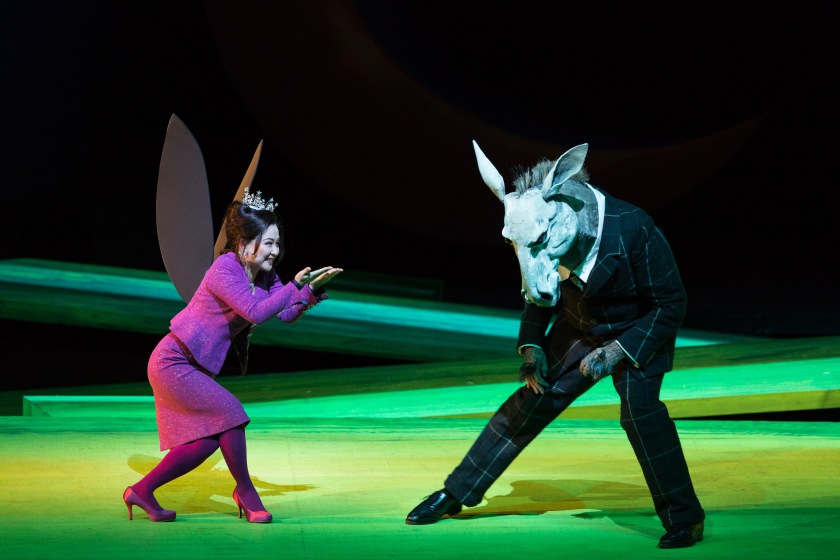
The biggest downside to freelancing is that when you’re working, your time most definitely isn’t your own (hence the weeks between my blog posts). Fortunately these demands haven’t interfered with my opera-going: I recently had the pleasure of seeing the Met’s revival of Britten’s “A Midsummer Night’s Dream” twice. And the exhilaration I felt when Puck, having the last word, flew like Peter Pan, lasted for several days.
Britten’s operas always surprise me. Not in the events of the drama, but in the sound his works produce. Think of “Billy Budd'”s aged Captain Vere fighting through brain fog in the opera’s Prologue, the crew’s mysterious shanty, their unearthly rumbling when Billy is executed. “Peter Grimes” is full of these moments. While you expect a duet from Peter and Ellen Orford, that searing unison vocal line, blending seamlessly into the first Sea Interlude, is electrifying. And despite all the foreshadowing, the chorus, calling Grimes out fortissimo, has to be one of the most chilling sounds to be heard in the opera house.
“A Midsummer Night’s Dream” is the comic side of this coin. What a stroke of genius to make Oberon a countertenor. Britten’s music for him is properly unearthly–this King of the Faeries has quite a dark side. Correspondingly his vocal line lies in the lower and middle countertenor range, an ambiguous place for this voice to be. He’s almost, but not quite, human—and almost, but not quite, androgynous. Iestyn Davies, whom I had only heard previously in a small role in Thomas Adès’ “The Tempest” gave a powerful performance—the role and the singer really made the case for this vocal category in the opera house.
At the other end of the spectrum are the so-called Mechanicals—the artisans who will present the story of Pyramus and Thisbe to honor the marriage of Theseus and Hippolyta. Bass Matthew Rose was ridiculously right as the weaver, Nick Bottom. His physical agility and the fluency of a lovely voice made him incredibly endearing in his scene with the besotted Tytania (Britten’s spelling). His request to the faeries who tend him (“Scratch my face–I am such a tender ass”) brought the house down. No wonder Tytania (soprano Kathleen Kim) called him her “gentle joy.”
Every measure of “A Midsummer Night’s Dream” seems incredibly right. Britten has a marvelous time incorporating so many musical influences: English folk song, Elizabethan dance, 19th century Italian opera for the quartet of lovers, and best of all, a bit of bel canto madness for Flute’s big lamentation as Thisbe. So many moments stand out: the string glissandi that signal we’re in Oberon’s world, the staccato solo trumpet and high drum that accompany Puck (a speaking role), and the comic setting of the word “moonlight,” which provides a consistent laugh every time the Mechanicals sing it. And most of all, that final faerie chorus supporting Tytania’s voice, seems to make time stop. This is such a magical work.
James Conlon, whom I wish would conduct more at the Met, led a superb performance. The artists were exceptionally well-matched, particularly the quartet of lovers: Erin Wall, Elizabeth DeShong (who will be singing Hermia again in the Met’s revival of “The Enchanted Island”), Joseph Kaiser and Michael Todd Simpson. And it goes without saying that the children’s chorus was phenomenal, easily producing the ethereal sound Britten’s score demands.
This year marks the hundredth anniversary of Benjamin Britten’s birth. What a way to honor his achievements.

